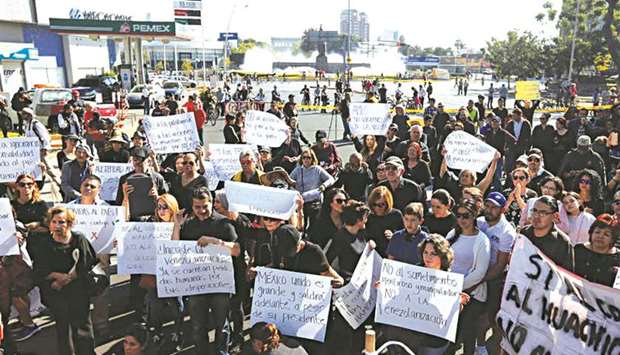Conceived as a bold plan to attack corruption, a crackdown by Mexico’s new president on rampant fuel theft has turned into a battle to prevent economic chaos after state governments, businesses and consumers were caught out by the decision.
Eager to purge a prominent stain on Mexico’s reputation, President Andres Manuel Lopez Obrador on December 27 unveiled a plan to increase military protection of oil installations and began cutting supply from pipelines that have been bled for years by thieves.
So far, the result has been more than a week of severe fuel shortages, shuttered gas stations and lines of motorists snaking around city blocks waiting hours to fill their tanks.
The 65-year-old leftist, who took office on December 1, will score a major victory if he can eradicate the parallel fuel distribution network which the government says has been run largely with the connivance of corrupt employees inside state oil firm Pemex.
Last year alone, the theft was worth $3bn, according to government figures.
But the pipeline shutdowns, which Lopez Obrador says were drawn up in his early morning security cabinet meetings during December, blindsided Mexicans when gas stations started to run dry in some of the country’s largest cities.
Officials in three affected states told Reuters they were not warned in advance about the supply cuts.
“There was zero co-ordination,” said Alejandro Guzman, head of economic development in the government of Jalisco, home to the country’s second-biggest city, Guadalajara. “We started to notice when the gas stations began closing.”
He estimated only a quarter of gas stations in the western half of Guadalajara had fuel during the past week.
Still, once the shortages became apparent, Pemex’s new management started to work well with the state to try to address the problem, he said.
The government spent most of its regular news conference on Monday morning discussing the fuel plan.
Pemex Chief Executive Octavio Romero said sales were recovering in affected areas.
“We’ll be back to normal soon,” Lopez Obrador said.
Government officials said three senior Pemex executives in charge of pipelines were under investigation over the fuel thefts, and that more than a dozen people had their bank accounts blocked.
None of the suspects were named.
The haphazard roll-out of the plan, in which millions of litres of fuel are delivered each day by tanker truck instead of by pipeline, is a new test of investor confidence in Lopez Obrador, who rocked markets by cancelling a partly-built $13bn airport five weeks before taking office.
A successful crackdown on theft would be welcome news for Pemex, which as the most indebted oil firm in Latin America faces the threat of a credit rating downgrade.
For now, however, Pemex is absorbing the higher cost of moving fuel by road.
If distribution problems persist, industry groups say manufacturing facilities like auto plants could soon idle.
The central bank has warned that fuel bottlenecks could stoke inflation and crimp growth in an already slowing economy.
Already, a new black market is emerging for gasoline resold at a premium by people willing to spend the time standing in line.
Usually bustling food markets in Mexico City have quietened down as shoppers and suppliers stay home to conserve fuel.
Facing reporters every weekday at 7am, Lopez Obrador has taken ownership of the theft crackdown.
But his officials have not always agreed on how quickly the crunch will be resolved.
Calling it the “first real domestic crisis” of the new administration, Andres Rozental, a former deputy foreign minister, said the fuel controversy had added to previous question marks about Lopez Obrador’s style of governing.
“There’s not enough communication and not enough coherence in the strategy,” said Rozental, a longtime diplomat turned business consultant.
Given the complexity and cost of protecting thousands of miles of pipeline, some analysts believe Lopez Obrador will have to back down before the theft is fully under control.
He says he will only reopen the pipelines when they are secured.
Polls suggest Lopez Obrador’s base still has his back.
A January 9-11 survey of 1,000 voters by polling firm Consulta Mitofsky said 50% backed his plan, while some 40% wanted fuel supply returned to normal immediately.
Lopez Obrador won office with just over 53% of the vote.
Some of the worst shortages have been in opposition-run states.
In one, the carmaking hub of Guanajuato, governor Diego Sinhue told local radio all but 7 of nearly 200 gas stations in Leon, the biggest city, were closed at one point.
Once a largely peaceful region, annual murders in Guanajuato leapt more than ten-fold between 2007 and last year to over 2,300, spurred by turf wars between gangs battling over the pipelines that crisscross the central state.
So the government’s decision to go after the fuel thieves was welcome, said Jose Arturo Sanchez, head of the Leon chapter of Mexico’s CCE business lobby.
But the planning that left drivers stranded, he said, was “totally irresponsible.”
“They didn’t consider the consequences,” he said. “In the 50 years I’ve lived in Leon, there’s been nothing like it.”
As with Jalisco, Sinhue said Guanajuato was not warned by the federal government the pipelines would be closed.
Nor was the city of Queretaro, capital of the neighbouring state of the same name, mayor Luis Bernardo Nava told Reuters.

People hold posters as they take part in a protest against fuel shortages near a gas station in Guadalajara, Jalisco, Mexico, on January 13, 2019.
